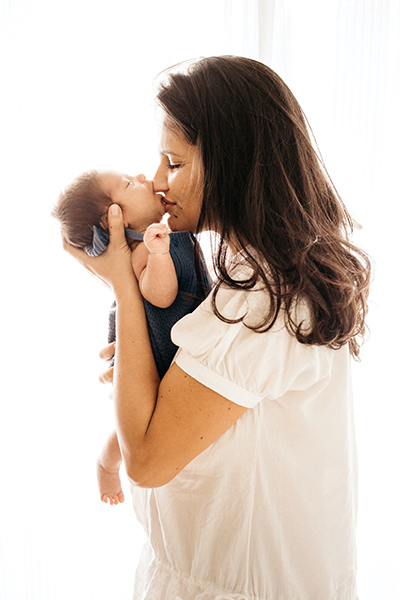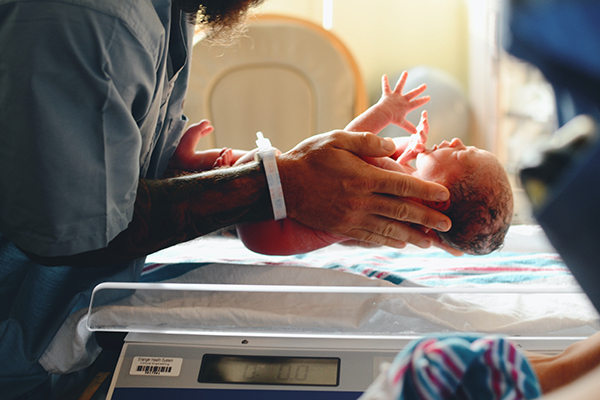No, it does not appear that pregnancy sensitizes an individual to be more likely to contract COVID-19 or to have more severe disease than what is seen in the non-pregnant population.
You will wear a face mask on labor and delivery. I recommend adhering to strict social distancing with a newborn – even pre-COVID-19. A newborn is unvaccinated and vulnerable to a wide array of bacterial and viral infections. Their immune system is naive and susceptible to most bugs. Due to concerns of exposure to COVID-19 in the hospital, strict precautions such as the use of personal protective equipment and regular handwashing are used to mitigate the risk of spread.
This is a difficult one – it is hard to know when this will be regarded as safe. It also depends on who the visitors are. For instance, if you were having your parent come to spend time with you during your maternity leave – you could ask that parents or support person to limit their contacts and take extra precautions to avoid exposure for ~14 days or longer prior to the planned trip, to minimize the risk of them contracting COVID-19 and transmitting it to you at home. I would err on the side of caution, and not lift the restrictions against home visitors until broader restrictions can be lifted on society and we are less worried about the rate and spread of infection.

Image: Jonathan Borba via Unsplash
There are no known links between COVID-19 and birth defects. The majority of studies of women in their third trimester, with COVID-19, who delivered during the pandemic have shown no sign of transmission of the virus into the baby, breast milk, cord blood, amniotic fluid or placenta. Since these initial studies, there have been sporadic case reports of being able to isolate viruses from the placenta. However, no studies have shown convincing data that the virus can be passed directly from mother to baby, while the baby is in utero – as newborns who were tested shortly after delivery are consistently found to be COVID-19 negative.
10) Can I still start/continue fertility treatments during this time?
Yes. Most fertility clinics took a short pause on treatment, at the height of the pandemic. However, in the last 1-2 weeks, we have begun treating patients again. It looks very different nowadays. Everyone who works in the office is wearing a mask, gloves, and sometimes even goggles – to protect themselves and patients. We are staggering our cases so that we have a more even, overall lower volume of patients in the office at any one given time. Although IVF is a low-risk procedure overall, we continue to strive to minimize the potential (mostly rare) risks of complications from ovarian stimulation and egg retrieval by being very conservative with any clinical decisions (ie. taking utmost care to minimize the risk of twins, which are high-risk pregnancies). We are doing many consultations via telemedicine to minimize in-person exposure.
11) Should those who are pregnant return to work when this pandemic has calmed down? What if they work in high-risk environments like schools?
This is a highly personalized decision. Because there is a lack of evidence to suggest that pregnancy, itself, is a risk factor for contracting COVID-19, or having a more severe illness, higher risk of hospitalization and/or mortality, there is no formal recommendation to pregnant women in the U.S. to avoid going to work – whether they are teachers or health care workers, who are more likely to be exposed. However, this is a novel virus and we admittedly are learning new things about it as time passes. Thus far, the data has been reassuring from both the maternal and fetal standpoint regarding safety. But we do not have complete data, particularly on earlier infections that take place in the first trimester. Preliminary data from second-trimester ultrasounds do not suggest an increased risk of fetal malformations or birth defects, which is reassuring.
For any pregnant woman who is concerned and wants to practice an abundance of caution until more time passes. We can then accumulate more data, it might be reasonable to decide to work from home. Some women have taken the decision to take medical leave or go on maternity leave early, to minimize exposure.

Image: Khoa Pham via Unsplash
12) Should I put a face mask on my child when we go outside?
If your child is 2 years old or older, you can try to have them wear a face mask. This minimizes the risk of exposure outside. I recommend practicing this indoors first. If your toddler is fussing with the mask and more likely to keep touching their face and the mask while wearing it, it may do more harm than good as they will be touching their face while outside, after touching potentially contaminated surfaces. If your toddler isn’t compliant with wearing the mask (as many won’t be) without frequently touching the mask or their face, the best measures are to maintain a distance of 6 feet or more from any other individuals while outside and to avoid enclosed spaces when with your child, if possible. It is also prudent to bring hand sanitizer with you on any outing to periodically clean your toddler’s hands.
13) Is frozen embryo transfer risky right now?
Frozen embryo transfer is a relatively low-risk procedure. It is a very simple procedure that does not require anesthesia. The procedure involves using a long, thin, flexible catheter to drop the embryo off a few centimeters from the top of the uterine cavity. It is done under ultrasound guidance in most clinics, so we are always aware of where the embryo is being deposited. The main risks of a frozen embryo transfer cycle are that the embryo may not implant (and you aren’t pregnant and have to try again), it could implant and result in a later miscarriage, or it could implant in the wrong place (ie. the fallopian tube) and result in an ectopic pregnancy that would need potential medical and/or surgical treatment.
With close monitoring of any pregnancy achieved from a frozen embryo transfer, your doctor will be aware of the pregnancy. It will appear normal vs. abnormal from an early stage and can monitor the situation accordingly.
14) Best morning sickness tips?
Try different measures until you find what soothes your morning sickness. Everybody is different and will have different triggers. For many, hunger will exacerbate morning sickness. Eating carbs or something salty will help to keep morning sickness at bay. If morning sickness progresses to frequent vomiting and inability to keep food and/or water down, it is important to consult your doctor. This ensures you aren’t getting to the point of dehydration or weight loss in early pregnancy. If it is severe enough, you may require observation at the hospital and IV fluid hydration. In this case, small doses of medication can work to control nausea and vomiting of pregnancy.
15) How long after a C-Section is it safe to try getting pregnant again?
16) Tips for those transitioning from birth control to attempting to have a child?
If on a long term birth control pill, you may need to be patient. It can take anywhere from 3-6 months for a normal ovulation pattern to be restored. If you haven’t gotten a period for 3-6 months or longer after stopping the pill, consult your OBGYN or a reproductive endocrinologist to investigate further. When using an IUD, it’s different. This is a quickly reversible form of contraception with effects that should cease as soon as the IUD is pulled out.
Once you are off birth control it is a good idea to keep a menstrual diary and keep track of when you get the first day of your period each cycle and to also note when you think you are ovulating based on physical signs/symptoms or the results of ovulation predictor kits. This will help you monitor whether your cycles have restored to a regular pattern and frequency, and to identify any potential gynecologic issues which may have arisen that could have been masked by long term contraception that either stopped your period altogether or produced a fake or synthetic period.

Image: Christian Bowen via Unsplash
17) Best prenatal vitamins to take to get pregnant and when to do it?
18) If I have previously had retained placenta and hemorrhage after giving birth, am I at risk again?
It depends on what the cause of the retained placenta and hemorrhage was. Will the placenta have a history of scarring of the uterus or prior c-section? You are definitely at risk of a repeat event and should be monitored closely in future pregnancies. Your OBGYN should be reminded of this history when you are admitted for labor and delivery so that they can be prepared in case of a repeat event and have all the necessary tools ready should you experience another hemorrhage.
19) Diagnosed with PCOS, both ovaries with 30 cysts. Any tips on how to get pregnant with PCOS?
=Polycystic ovary syndrome (PCOS) is most relevant to fertility when it causes cycles to be irregular. This indicates that you are not ovulating regularly. This can make it very difficult to time when to have sex and try to conceive each cycle. Also, it can make your attempts very inefficient as you may have long periods of time between each cycle/ovulation. So, over time, you have fewer chances than the average person who normally ovulates every 28-30 days. It is important to seek the help of a reproductive endocrinologist and infertility specialist. They can prescribe medications to help get your cycle on track. And also get you to ovulate more regularly and in a predictable manner. We can also help you time when to have sex by more accurately detecting when you will ovulate.
Ovulation predictor kits often give false-positive results. Sometimes, patients with PCOS tend to have high baseline levels of the main hormone.
20) How to deal with hormonal anxiety?
It depends on how severe it is. For some women with mild symptoms, recognizing that the anxiety is stemming from hormones and premenstrual syndrome is often enough to help alleviate it -once you acknowledge it, it may dissipate. It is also helpful to keep a journal documenting how you are feeling so that you can recognize patterns and understand the triggers better. Explore different coping mechanisms- whether it be calling a friend or family member and leaning on them for support, or using exercise/meditation/acupuncture to help work through the anxiety. Some women have more severe symptoms of anxiety/depression that seems to be related to their menstrual cycle. They may have something more serious than just plain old PMS.
PMDD (premenstrual dysphoric disorder) is an actual diagnosis. There are many medical interventions as well as non-pharmacologic therapies that can help with this.

Image: Filip Mroz via Unsplash
Recents posts
–>
May, 14 2020
Sporteluxe inspires its global audience to live healthier, more fulfilling lives.
